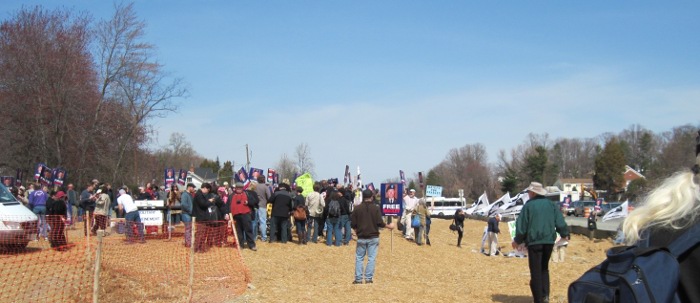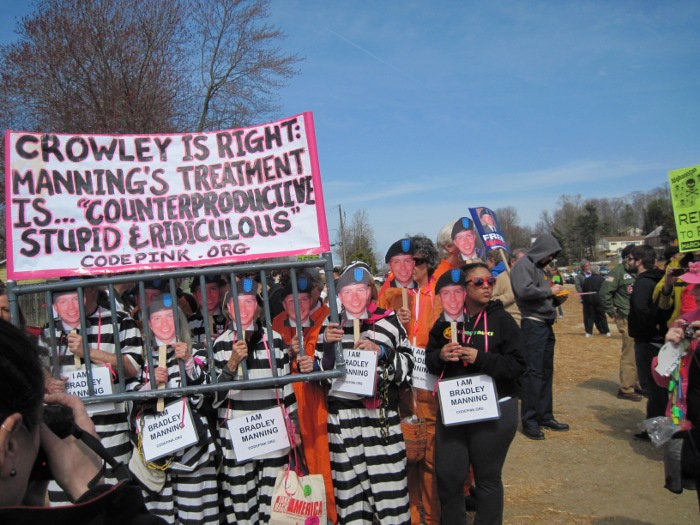Protest
over
the treatment of PFC. Bradley Manning
20 Mar 2011

Our group assembles. There were about
400 of us there to protest how Private Manning (He's still a
soldier on active duty) has been treated while awaiting trial on the
charge of passing a huge cache of information over to Wikileaks.
[T]he office of Manfred Nowak, United
Nations special rapporteur on torture, confirmed that they received an
official complaint about Manning’s situation. Two other United Nations
special rapporteurs also released a joint statement meant to “recall a
number of international legal principles”, point number three being
protection for so-called “whistle blowers” when they release
information about wrongdoing.
Here's the entrance to the Marine Corps base at Quantico, VA. We never
set foot inside the railings. 35
of
our group were arrested because they were blocking the gate by
sitting down in front of it.
The protestors remained cordial until
police in riot gear formed a wide barricade in the middle of the U.S. 1 and Joplin Road intersection.
Prince William
police spokesman Jonathan Perok said some demonstrators stood
on U.S. 1 and refused to move.
“At this point, an unlawful assembly was
declared and as a result approximately 35 total arrests were made,” Perok wrote in a news release.

Daniel
Ellsberg, who spoke and was afterwards arrested, said:
“Bradley Manning, if he was the source,
can well feel that he was one critical link in the chain of actions and
events that led to the downfall of the dictators in Tunisia and in
Egypt,” said Ellsberg. “I don’t know of another revelation… that has
[had] such an immediate and immense effect in the direction of human
rights and democracy. We owe him a great debt… If he is found to have
been the source there will be statues of him in Tunisia, in Egypt, I
think. Just like [there will] probably [be] a statue of Mohamed
Bouazizi, who gave his life, burned himself to death, to protest what
was going on [in Tunisia]; another critical link in that chain of
events.”
Here's our two-person band. They sang a number of golden oldies we all
recognized.
Facebook photos by Bill
Perry. Bill and I arrived together and stayed until the very end.
FireDogLake's Bradley
Manning page. Includes not just the latest pieces on him, but many
links with which one can tell authority figures what we think about how
he's being treated.
Major problem for the US Government is that they
simply
can't tie Manning to Julian Assange of Wikileaks.
Manning himself would have broken a
contractual obligation as a US government employee if he leaked
classified documents, but civilians who received such documents are
difficult to prosecute.
As to why
Manning
is being treated the way he is:
I suppose we are supposed be grateful
that they are only using this particular technique on an American
soldier for seven hours a day instead of the weeks or days they
routinely used on Al Qaeda members. Perhaps they learned through their
long experience at Gitmo and Bagram that combined with the sleep
deprivation and isolation, the intermittent
period of being clothed and naked coerces false accusation and
confessions more easily. That's the only proven result of such
techniques, after all.
Daniel Ellsberg speaks.
Is Manning being
tortured?
The American government, of course,
insists that such treatment does not rise to the level of torture. In
fact, Col. T. V. Johnson, a Quantico spokesman, characterized charges
that Manning has been mistreated as "
poppycock." After all, Manning is not being
starved, beaten or waterboarded. He's merely been denied human
interaction and the most basic attributes of civilized imprisonment.
Yet as surgeon Atul Gawande points out in a 2009
article for the
New Yorker, solitary
confinement rises to the level of torture: "A U.S. military study of
almost a hundred and fifty naval aviators returned from imprisonment in
Vietnam, many of whom were treated even worse than [John] McCain,
reported that they found social isolation to be as torturous and
agonizing as any physical abuse they suffered."
"Blowing the whistle" may
just
be exactly what the President is objecting to.
The inhumane treatment of Manning
plainly has two principal effects: it intimidates future
would-be whistleblowers into knowing that they, too, will be abused
without recourse, and it will break him psychologically (as
prolonged solitary confinement and degrading treatment
inevitably
do) to render him incapable of a defense and to ensure he provides
whatever statements they want about WikiLeaks. Other than Obama's
tolerance for the same detainee abuse against which he campaigned and
his ongoing subservience to the military that he supposedly "commands,"
it is the way in which this Manning/Crowley behavior bolsters the
regime of secrecy and the President's obsessive attempts to
destroy whistleblowing that makes this episode so important and so
telling.
As the left and the right switch sides in their views of President
Obama, at least on this one issue.